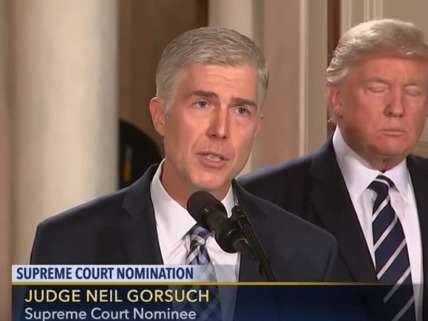Gorsuch Defends Illegal Immigrant's Rights, and Progressives Are Appalled
Neal Katyal says a ruling cited by the SCOTUS nominee's opponents shows why liberals should support him.

People for the American Way (PFAW) cites Gutierrez-Brizuela v. Lynch, a 2016 decision by the U.S. Court of Appeals for the 10th Circuit, as evidence that Neil Gorsuch is unfit for the Supreme Court. Meanwhile, in a New York Times op-ed piece, Neal Katyal, a solicitor general in the Obama administration, cites the same case as an illustration of "Why Liberals Should Back Neil Gorsuch." These diametrically opposed takes show why it is hazardous to view constitutional law as a battle between liberals and conservatives.
PFAW does not like Gorsuch's questioning of the Chevron doctrine, which says courts should defer to executive agencies' interpretations of ambiguous statutes, even to the point of reversing prior judicial interpretations. "Eliminating this principle…would tie the hands of precisely those entities that Congress has recognized have the depth and experience to enforce critical laws, safeguard essential protections, and ensure the safety of the American people," PFAW says. It neglects to mention that Gutierrez-Brizuela involved immigration law, and Gorsuch came down on the side of a longtime resident trying to legalize his presence in the United States. Sounds kinda liberal, no?
The decision dealt with an apparent conflict between two provisions of immigration law. One gives the attorney general "discretion to 'adjust the status' of those who have entered the country illegally and afford them lawful residency." The other "provides that certain persons who have entered this country illegally more than once are categorically prohibited from winning lawful residency…unless they first serve a ten-year waiting period outside our borders."
In 2005 the 10th Circuit ruled that the first provision supersedes the second, so even residents who have illegally entered the country more than once can still obtain legal status without waiting 10 years outside the United States. Two years later, the Board of Immigration Appeals (BIA), an administrative agency, decided the second provision limits the attorney general's discretion, meaning the waiting period is unavoidable. In a 2011 case, the 10th Circuit acceded to the BIA's interpretation, as required by the Chevron doctrine.
Last year's case involved an unauthorized immigrant, Hugo Rosario Gutierrez-Brizuela, who petitioned for a change of status before the new interpretation was adopted. In the majority opinion, Gorsuch noted that applying the new interpretation retroactively would not only violate the usual rules of statutory construction but raise "due process and equal protection concerns," since immigrants who had made decisions based on the previous interpretation would suddenly have the rug pulled out from beneath them:
After all, back in 2009 the law expressly gave Mr. Gutierrez-Brizuela two options: he could seek an adjustment of status…or accept a ten-year waiting period outside the country. Relying on binding circuit precedent, he chose the former path. Yet the BIA now seeks to apply a new law to block that path at a time when it's too late for Mr. Gutierrez-Brizuela to alter his conduct. Meaning that, if we allowed the BIA to apply Briones here, Mr. Gutierrez-Brizuela would lose the seven years he could've spent complying with the BIA's ten year waiting period and instead have to start that waiting period now. The due process concerns are obvious: when Mr. Gutierrez-Brizuela made his choice, he had no notice of the law the BIA now seeks to apply. And the equal protection problems are obvious too: if the agency were free to change the law retroactively based on shifting political winds, it could use that power to punish politically disfavored groups or individuals for conduct they can no longer alter.
Gorsuch also wrote a concurring opinion, and that is where he directly challenged the Chevron doctrine, which PFAW presumably would argue was unnecessary to resolve the issue of retroactivity. But in the concurring opinion Gorsuch emphasized that Chevron deference endangers liberty by weakening the separation of powers, under which Congress passes laws, the executive branch enforces them, and courts decide disputes about their meaning. "The founders considered the separation of powers a vital guard against governmental encroachment on the people's liberties, including all those later enumerated in the Bill of Rights," he wrote. "A government of diffused powers, they knew, is a government less capable of invading the liberties of the people." Giving one agency the power to interpret and rewrite the law as well as enforce it poses a clear threat to people at the agency's mercy, including highly vulnerable people like Gutierrez-Brizuela.
Here is how Katyal, who notes that he and Gorsuch "come from different sides of the political spectrum," describes the judge's position in Gutierrez-Brizuela and an earlier immigration case that addressed a similar issue:
Judge Gorsuch ruled against attempts by the government to retroactively interpret the law to disfavor immigrants. In a separate opinion in Gutierrez-Brizuela, he criticized the legal doctrine that federal courts must often defer to the executive branch's interpretations of federal law, warning that such deference threatens the separation of powers designed by the framers. When judges defer to the executive about the law's meaning, he wrote, they "are not fulfilling their duty to interpret the law." In strong terms, Judge Gorsuch called that a "problem for the judiciary" and "a problem for the people whose liberties may now be impaired" by "an avowedly politicized administrative agent seeking to pursue whatever policy whim may rule the day." That reflects a deep conviction about the role of the judiciary in preserving the rule of law.
Critics of Gorsuch should not be taken seriously if they can't recognize (or refuse to acknowledge) the ways that "conservative" convictions can achieve liberal ends.
